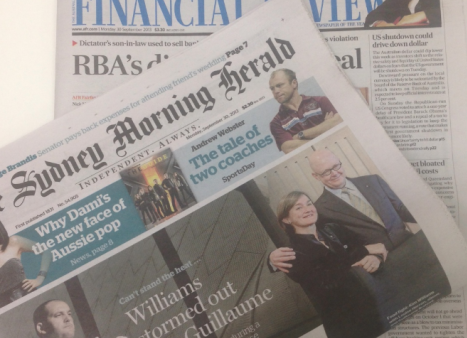How do we bridge the growing gap between media agencies and media owners?
A worrying rift is growing between media agencies and media owners, and unless the two learn to communicate effectively, the latter could be facing serious trouble. Adrian Smith takes a look back at where we've been, and whether the future looks any brighter.
I remember the very first advertisement I booked early in my media career. It was a “10×2”in The Sun (yes, way before The Sun and The Herald merged in 1990) and the responsibility was given to me by my group head at the time, who explained exactly who to ring and what to say, and thankfully it all went without a hitch.

A simpler time…
I knew what I wanted, they knew what I wanted, the ad ran and everyone got paid. Brilliantly simple.
This worked well for clients, media owners and agencies for some time. A creative media solution consisted of billboards on the Sunday night movie or a gatefold in the relevant magazine. A couple of live reads here and there on the wireless and the job was done.
That was fine for the late ’80s and early ’90s, but things started to change.
Along came unbundling. Parent companies decided that creative agencies should jettison their media departments (or vice versa depending on who you talk to) and a new arena of competitiveness was established, at a time when as an industry we were embracing technology that enabled us to understand so much more about our strategies than ever before.
Enter the era of one-upmanship. To be competitive, each agency had to undertake an exercise of continuous improvement, adding new bespoke tools and levels of complexity in order to demonstrate a greater understanding of brands, consumer behaviour patterns, etc.
Media agencies have moved on, and the way media owners are trying to sell to them is anchored in the past. These days agencies are all about analytics, data and sophisticated targeting methodologies.
Perhaps media owners in the digital space are more closely aligned with how agencies are thinking and working largely due to the intrinsic nature of the properties they are selling. If only those agencies and their clients could have a little more faith in the numbers, things would be rosy.
But back in traditional media land, we’re presenting agencies with simple proposals that in no way synchronise with what they are looking for. The “one size fits all” mentality might be convenient for the media owner, but that in itself is self-defeating.
It’s no use any sales team beating down the media agencies’ door with their current gusto. We need to change our approach to match their needs.
Now I’m sure there’ll be many media owners out there crying “we already do that”, but during my most recent tenure within a media agency I didn’t see one example of this in practice. After querying that agencies’ head, he agreed the gap was real and getting wider.

A media owners losing relevance with today’s agencies?
How do we achieve greater relevance? We first need to understand how our product can integrate with the strategy outlined by the planners.
This means moving ourselves up the decision tree – getting an audience with those that are developing the communication plan and tailoring our offering to suit them and not us. It means doing away with the “packages” we spruik because it suits us to do so. It means customising our properties to suit the strategy.
But it also means cooperation from agencies: let us know much earlier what you’re trying to achieve and give us the time to craft a response specifically tailored to your needs – less to and fro means less opportunity for misunderstanding.
Of course, many agencies are already working this way and are getting significantly better responses from media owners – to everyone’s benefit.
Ultimately we all want and can achieve the same thing – success for our client partners.

Adrian Smith is a sales development director whose career has seen him work across both media agencies and media owners.




What rift? We ain’t got no rift.
User ID not verified.
Is this a cover letter for a job application accidentally posted as an article? Can someone please check.
User ID not verified.
Yeah you’re right, perhaps he should be more like you and spend his time anonymously bringing down others on company time. Thanks for making such a valuable contribution.
User ID not verified.
Smithy in a tie, reminiscing about the old days. I bet there was an account query with that 10 x 2.
User ID not verified.
Easy fix, leaves personal agenda’s at the door. Then stop talking about bridges, how great they can be and build them.
User ID not verified.
I don’t see the issue with this article at all – he raises some valid points and many would agree, including me. Would be good to see a part 2 with some suggestions on how to bridge the divide
User ID not verified.
I didn’t read this article but i agree based on the headline. /s
User ID not verified.
As someone who trains media sales teams on responding to agency briefs, I can add some colour & detail to Adrian’s comments. The major issue here is around communication, and it definitely runs both ways. Agencies’ briefs vary from a few lines on email to 100 page powerpoint decks. But in either case, sometimes there can be a lack of clarity around the campaign’s business and marketing objectives. I’ve seen briefs containing sections on business objectives, media objectives, role of communications, desired outcomes and success metrics – all of which don’t match. The second thing that can go wrong is the lack of human to human conversation to dig into (and clarify) the brief. Often sales people don’t ask the right questions, or just as often, they cant get hold of the person in the agency who knows the answers.
So, at this point we’re not set up for success. The media sales person responds to the best of their ability, but they can end up with a spray and pray approach of suggesting lots of options, hoping that one will fit. And they can be guilty of spending too much time in the response talking about their own medium, not the client’s problem.
If you think about it, the major communication here is one thing: email. Doing all these briefs and responses via email (and we know that around 80%+ of responses are not presented face to face) means no opportunity for exploring, questioning, tweaking or even rapport building.
So, get off email. Get on the phone (remember that thing on your desk called a landline, it used to ring several times a day?!). Find a way of presenting a response face to face in 15 minutes. And invest in the human relationships.
User ID not verified.
As a plug for the Media Federation, we are working with them to run a workshop called Trading Places for their ngen community on Sep 12th in Sydney. It’s targeted at exactly this problem – having media owners and media agencies understand each other’s perspective. Please send your ngen members along.
User ID not verified.
“not one’ says more about the agency than it does the media owners. Agencies either order via interns (void of any decision making capabilities outside a standard rate card) or otherwise tend to take the safe stock standard route seeking low price over the courage to explore something different that might actually achieve the outcome the client is seeking. Fun times.
User ID not verified.
All the smart media sales people moved on to greener pastures some 5-10 years ago, while at the agencies, the bulk of the work was pushed to interns and “executives” who don’t know anything and don’t have the authority to make any decisions even if they did.
What could possibly go wrong?
User ID not verified.
Yeah – This nails it
User ID not verified.